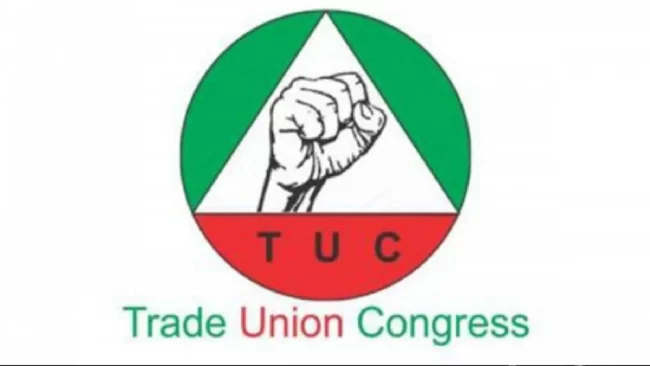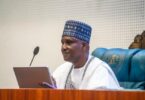President of the TUC, Comrade Festus Osifo who briefed newsmen on Thursday in Abuja at the end of the union’s National Executive Council (NEC) meeting in Abuja, said the contractors at the Port Harcourt refinery and the Nigerian National Petroleum Company (NNPC) Ltd, had given assurances earlier in the year at an inspection to the refinery, that it would be running optimally by the first week of April 2024.
He said: “During that inspection, the contractors and those that are employees of NNPC told us clearly that refinery is going to come into fruition at the first week of April or thereabout.
“Today, we are approaching the end of April and production has not resumed in the old Port Harcourt refinery
“We wish to hereby call on government to do everything within its antenna to ensure that the old Port Harcourt refinery starts production immediately. You could go outside today and you can see queues everywhere in FCT and in some other neighbouring states.
“But we firmly believe that if our refineries were working optimally today, sich queues wouldn’t have been there.”
Osifo who commended the initiatives put forward for oil and gas production, however insisted the need for the country to increase crude oil production inorder to boost foreign exchange, stabilise the naira viz-a-viz the economy.
“Recently, the President signed an executive order regarding some incentives for oil and gas production because today there is a reduction in investment in the oil and gas industry. If you could remember in our last press briefing, we clearly stated that part of the reason we are having shortage of Fx today is because of our reduced crude oil production.
“If this country go back to the era we were producing 2.2 to 2.5 million barrels of crude per day, the inflow of forex amidst the high cost of crude oil today in the international market will give us a lot of foreign exchange in our country and it will help us in stabilizing the naira.”
“We are urging government to deepen the fiscal incentives because today crude oil is found literally everywhere in the world. Gone were those days when crude was just found in about four or five six countries in Africa. Today, crude is literally in almost every country in the world so we encourage the government to continuously move in this path.
“If we keep shouting, pushing and dancing to the dictates of the IMF and World Bank and all the international agencies regarding the issue of oil transition, we are going to lose it because as a country we need our oil and gas to boost our foreign exchange earnings. That is the surest way as of today, and that is the quickest way to ensure that our Naira is stabilised.”
On the new minimum wage, Osifo urged the committee om minimum wage to fast track their activities to address the difficulty of purchasing the high cost of goods and services amidst low purchasing power.
“The government has to do everything possible to ensure that this is fast tracked because the only way you can inflate your economy is when you empower the working class. The only way you can inflate your economy is when people have money to purchase goods in the supermarket, when people have money to go to the regular market to purchase items.
“If there is nobody to purchase these items, if the purchasing power parity is relatively low, what is going to happen is that the manufacturers will produce their goods and they will keep it because there wouldn’t be patronage from the people.
“So we demand that the committee on minimum wage should fast track their activities so that a new minimum wage will be put in place. This is the only way that the economy will be re inflated.”
While asking the federal government to pay the outstanding wage awards for March and April, as well as to ensure regular payment of the wage award, TUC called for the review of the labour laws, which it insisted was obsolete.
“For several years we have been trying to review the labor law. All attempts to get the ninth National Assembly to pass the new labor law did not materialize.
Today we have the 10th Assembly and currently the Labour law has not been laid before them. We want to urge the Federal Ministry of Labor, the federal government of Nigeria and all stakeholders to ensure that the Labour law is reviewed, is drafted, is sent to the National Assembly and passed into law because we cannot be operating with an obsolete law as people operating in the 21st century in 2024. We shouldn’t be applying laws that were passed several years ago, that is really obsolete.”
Condemning the non-representation of organised labour in the committee set up to review, implement the Oronsaye report, TUC demanded immediate inculcation of its members of TUC into the committee, warning that the union would not accept any fallout that would impact on its members when the committee concludes without them.
While commending Borno, Oyo, Rivers, Ebonyi, Bayelsa, Lagos, Rivers states and the FCT for mitigating the hardships Nigerians were facing through wage award, palliatives and other substantive solutions, the TUC raised concerns over the inability of Benue and other State Governments in putting mechanisms in place to address the hardship confronting workers and the masses in their respective domain.
“Even some states in the Niger Delta that are receiving over N20 billion per month have literally done nothing to solve the challenges today and put in place a sustainable solutions for tomorrow and top on that list is Benue State. Benue State has done literally nothing for its workers and the masses.
“We hereby call on the government of Benue to put in robust mechanisms to solve the economic challenges that our members and the masses are passing through in the state.
“Also the state of Anambra, Imo, Delta to uplift the plight of workers and the masses in their states. Others are Akwa Ibom, Kebbi and Katsina
“In the coming days we will be engaging these states that have done nothing, we will be pushing them to do the needful because it is time we trickle it down from federal to the state and local governments.
On estimated Billings and hike in electricity tariff, the TUC urged government to prioritise mass metering to ensure every Nigerian only pay for electricity consumed, as well as stakeholders engagement whenever they were plans to increase electricity tariff.






